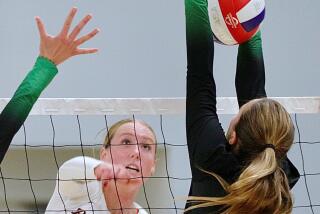Her World Is Now a Mountain Hamlet : Volleyball: Antelope Valley product brings her experience as an international player to Flagstaff as women’s assistant at Northern Arizona.
- Share via
A few snapshots from the travels of Deitre Collins through some of the world’s tourist hot spots during her years as an international volleyball standout. . . .
Click
Here she is, fresh off the plane, wearing a lei on her way to collegiate stardom at Hawaii.
Click
Look at her dive and dig that thunderous spike by the Chinese outside hitter at the Olympic Games in Seoul in 1988.
Click
Observe the intensity on her face as she stuffs opponents at the net in the French and Italian professional leagues.
Click
Watch her admire the ponderosa pine trees in Flagstaff, Ariz.
Flagstaff ? How did that slide slip into the projector? Who goofed?
Actually, no one did. For now, the small mountain town 137 miles north of Phoenix that has been home to Northern Arizona for nearly a century is also where Collins, a former All-Southern Section player at Antelope Valley High, is getting her mail. And that’s fine with her.
Last month, Collins was hired by first-year Coach Kelley Sliva as her top assistant on the Lumberjack Division I women’s volleyball team. It’s a long serve from the glitter and glamour of Paris and Rome, but Collins says the place and the job have their own irresistible appeal.
“A lot of coaches have come through here and gone on to bigger programs,” Collins said from Northern Arizona. “There’s a lot of interest in volleyball in this area.”
Collins, 31, wants to help keep that interest constant. As a 6-foot middle blocker on the U.S. national team for five years, she was a key figure for the Americans in many international events, including the 1988 Olympics. Now she plans to use that background to play a prominent role in the Northern Arizona program.
“I learned a lot on the national team,” Collins said. “Having been in that situation can help me in dealing with the players.”
With the Lumberjacks, Collins will handle some recruiting and work extensively with the middle blockers. She is coming off a one-season stint as a restricted-earnings assistant at Houston, for which her duties were much more limited. She is eager to undertake a bigger responsibility. Working with Sliva will give her the chance.
“Anytime you can play at the international level, you are going to bring a wealth of knowledge to a program,” said Sliva, an assistant at USC for four seasons. “I really believe that in order to grow as an assistant coach, you have to have a certain amount of autonomy, and I’m willing to give her that.”
Northern Arizona players will have no reason to question Collins’ credentials. She dominated as a collegiate player, controlling matches and carrying her team. The court was her domain and she missed few opportunities to send the message to the other side.
“She was very explosive,” said Dave Shoji, the veteran Hawaii coach. “She was such a force because she had such a quick jump, and if you weren’t right with her, you couldn’t stop her. When she got excited, she was virtually unstoppable.”
For Collins, the transition from high school volleyball to a leading college program wasn’t easy.
Although highly regarded during her career at Antelope Valley, Collins relied primarily on her superior athletic ability when playing volleyball. She was a sprinter and long jumper, and a capable enough basketball player--”my true love”--to have played small forward one season at Hawaii.
“When I first played (volleyball) in high school, I know I was pretty terrible,” she said.
The turnabout started when Collins was selected for an Olympic development program in Los Angeles while still at Antelope Valley. The three-hour weeknight practice sessions were as grueling as the round-trip from Lancaster, where Collins grew up after moving from her native L.A. because her father was stationed at Edwards Air Force Base. But the work paid off.
After watching a videotape of Collins in action, Shoji offered her a scholarship even though he had never recruited her. The coach remembers seeing a player full of potential, one he considered a project who could reach unlimited heights with proper training.
“She was raw but she had the physical tools,” Shoji said. “She became a good player very quickly.”
Like a comet, to be exact. She was a three-time All-American and led the Rainbows to NCAA Division I titles her junior and senior seasons, capping her career at Hawaii by winning the Broderick Award as the top collegiate player in 1983. That year, she also became the only volleyball player to receive the Broderick Cup as the top female college athlete in the country.
“That was probably the most meaningful thing that happened to me in sports,” Collins said. “That and, of course, going to the Olympics.”
Her longtime ambition of playing in the Olympics materialized five years after leaving Hawaii and three years after joining the U.S. volleyball program. At the women’s tournament in Seoul, Collins was the starting middle blocker for the United States, but the team finished a disappointing seventh after winning the silver medal in Los Angeles four years before. It was the last major international competition for Collins with the American squad.
Soon after the Olympics, Collins accepted an offer from an Italian pro club in Fano, a city on the Adriatic Sea near San Marino. She spent two unhappy seasons there.
“Playing was fun and the competition was great, but the mentality of the people who ran the league was hard to put up with,” Collins said. “Anything that goes wrong on those teams is the Americans’ fault.”
When her contract was up, Collins signed with Club Racing of the French “A” Division and led the team to two titles. She also helped the team advance to the final four of the European club championships her first season, 1989-90. The move to Paris hit her in the pocketbook but Collins said she reaped other benefits.
“I took a pay cut for happiness and peace of mind,” she said. “The Parisian lifestyle is fast and cold, kind of like New York. But it’s a beautiful place and there are a lot of American athletes there. I didn’t care much for the people in Paris, but when we traveled to other parts of the country, the people were great.”
Collins returned home in 1991 with the idea of making the U.S. team for the 1992 Olympics in Barcelona. But nagging injuries--she has had six operations, including three arthroscopic knee surgeries--and a bulging disk undermined her attempts. She failed to survive the final cut. The setback prompted a change in plans and Collins accepted an assistant post at Houston.
Now, it’s on to new adventures and more entries for her travel log in the Arizona desert.
Said Sliva: “For Deitre and I, it’s going to be fun to sit down and talk about (volleyball) and get our program going.”
More to Read
Go beyond the scoreboard
Get the latest on L.A.'s teams in the daily Sports Report newsletter.
You may occasionally receive promotional content from the Los Angeles Times.










